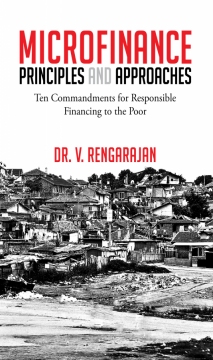
- Discover books
- For Writers
-
For Writers
-
Indie Author Championship
-
Challenges
Writing Contests
- Get Started

"It was a wonderful experience interacting with you and appreciate the way you have planned and executed the whole publication process within the agreed timelines.”
Subrat SaurabhAuthor of Kuch Woh Pal -
-
-
IN
- India
- Singapore
- Malaysia
- 0
Dr. V. Rengarajan
author of microfinance bookV. Rengarajan received Doctorate in economics from Pondicherry Central University. M Phil from university of Madras. Served as researcher in Economics Department in University of Madras for 10 years, and in Madras Institute of Development studies (MIDS)for 2 years. As a senior economist, in charge of Economic Research dept in a nationalized bank (Indian Overseas Bank) formulated District Credit Plans and conducted a number of research and evaluation studies pertaining to financing for microenterprise development in rural area and micro financing for poverty reduction programmes for 25 years. ARead More...
V. Rengarajan received Doctorate in economics from Pondicherry Central University. M Phil from university of Madras. Served as researcher in Economics Department in University of Madras for 10 years, and in Madras Institute of Development studies (MIDS)for 2 years. As a senior economist, in charge of Economic Research dept in a nationalized bank (Indian Overseas Bank) formulated District Credit Plans and conducted a number of research and evaluation studies pertaining to financing for microenterprise development in rural area and micro financing for poverty reduction programmes for 25 years. As a professional international consultant in Micro finance, for APRACA/IFAD (Asia Pacific Rural and Agricultural Credit Association Consultant Services,) Jakarta, Indonesia.. and Agricultural Finance Corporation Ltd,(AFC) Mumbai, India as state consultant, conducted evaluation and research studies connected to microfinance in many Asian countries.. Advisor to a national NGO for research and evaluation on Micro financing and SHG programmes in Tamil Nadu and Jharkhand states. Invited for guest lectures in national and international universities and as resource person for international workshops in Bangkok(APRACA), South Korea(Kon kun University) & USA(Rockherst university). Presented about 70 technical papers on rural banking and micro financing in national and international conferences /seminar/workshops/.Publication includes eight books and 70 papers in technical journals.
Also acted as visiting professor to Mrs. Helena Kaushik women’s PG college in Rajasthan. Recently, as a senior consultant to NGO Hand in Hand Chennai and presently to Madras Institute of development studies for doing impact evaluation NABARD. funded projects and conduct of ICSSR Orientation programme for PhD scholars and faculty members, Guidance to PhD students doing research studies on Microfinance and inclusion. Delivered three lectures on research methodology at orientation programme for research students and faculties in social science studies at Madras Institute of development studies Chennai. Since 2022 he is a founder memebr of Pan India society for pathways to sustainability (PATHS)
Read Less...Crop your profile image

Mystic Inclusion
Books by Dr. V. Rengarajan
In the context of much touted ‘inclusive economic growth’ the urgency of the concern is to discern the fact on a) what has happened ‘after the inclusion’ so far achieved, in the demand side from deontological perspectives? b) Is the inclusion also inclusive enough? C)Is there any unceremonious exclusion after ceremonious inclusion made through inclusion oriented interventions without ensuring sustainability? This monograph seeks to pro
In the context of much touted ‘inclusive economic growth’ the urgency of the concern is to discern the fact on a) what has happened ‘after the inclusion’ so far achieved, in the demand side from deontological perspectives? b) Is the inclusion also inclusive enough? C)Is there any unceremonious exclusion after ceremonious inclusion made through inclusion oriented interventions without ensuring sustainability? This monograph seeks to probe the fact empirically.
The ‘Inclusion’ of the excluded has two dimensions viz., Spatial or geographical inclusion and Human inclusion. From economic growth perspectives, the term ‘Inclusive inclusion’ requires a holistic inclusion of area qualitatively with the integrated productive connectivity infrastructure for running sustainable economic activities. This Aside, from development orientation, as a corollary to the so called inclusive inclusion demands a comprehensive human development of the people in the included habitation. In the context of nonappearance of these qualitative dimensions of inclusive inclusion, any claim, with mere numerically supported inclusion, for any inclusion oriented intervention for that matter, be it concerned with social, education, health and financial one, symbolizes only a “Mystic inclusion.” A critical analysis has been made on a slew of empirically tested evaluative findings for demystifying the hidden truth on the impact of the inclusion. As a way forward, Bharthya approach is suggested focusing on Indianization of planning system at district level and indigenization of the product and services that suit the marginalized people at the bottom level of poverty pyramid, has been made for facilitating candid inclusion from ‘Make in India’ perspectives. Towards this end, for the benefit of the research students and academic institutions, some useful hypotheses on the inclusion and poverty are presented for testing in future studies and developing new theories for filling large gap on the subject in social science.
Microfinance -Principles and Approaches
Books by V.Rengarajan
Over confidence on meek financial capability of sequestered micro credit for the given task in poverty sector has led to unpalatable events such as moral deterioration of the actors and unethical market environ shaken by some recent micro finance crisis in many developing countries despite warning signals in the supply front. At the same time persistent vulnerability and deprivation, inequitably distributed even in poverty pyramid on the other in the demand si
Over confidence on meek financial capability of sequestered micro credit for the given task in poverty sector has led to unpalatable events such as moral deterioration of the actors and unethical market environ shaken by some recent micro finance crisis in many developing countries despite warning signals in the supply front. At the same time persistent vulnerability and deprivation, inequitably distributed even in poverty pyramid on the other in the demand side is evident. Both these factors primarily have caused a major ‘inclusive’ development concern at global level.
In the given backdrop, the scope of the book is to critically probe in detail the gap between the Micro Finance principles and practice. Further it broadly covers theoretical facts on financing the poor at household level and critical events that acted as drivers leading to moral deterioration in this industry. An attempt has also been made to look at Micro Finance through Amartya Sen’s lens from development perspectives. As a way forward with a new approach, an attempt has been made to suggest ethically coded ‘Ten commandments’ for the Micro Finance industry personnel for rejuvenating this industry from moral crisis and sustaining the graduation of the bottom with more accountability. For the benefit of Micro Finance community and academia, the book is so designed sequentially with the subjects for discerning both theory and applied sides of Micro Finance and presented in two parts. Part -1 delves the principles of Micro Finance from ethical perspectives covered in 6 chapters while Part-2 demonstrates new framework for future approach in the applied side for a responsible financing to the poor in the form of ten commandments for micro finance community spread over in 11 chapters. Appendix includes ethical codes for Micro Finance, pilot innovative Micro Finance projects and references.

Are you sure you want to close this?
You might lose all unsaved changes.
Select from one of our global stores to continue
 India
India
 Singapore
Singapore
 Malaysia
Malaysia
Warning Message
The items in your Cart will be deleted, click ok to proceed.












